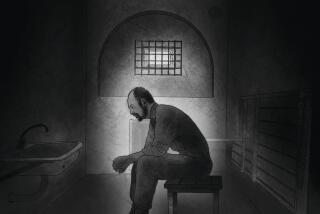With Party Evicted, Soviet Inn Opens Doors to Public : Reform: Commoners get a peek at lifestyles of rich and famous--the Communists.
- Share via
YAKUTSK, Soviet Union — The six-story building is painted an anonymous gray, with no sign above the door to give a hint of the opulence inside. The only clue is the red-and-white barrier surrounding the building to keep the uninvited from treading on the immaculate marble steps.
Welcome to Hotel Obkom.
Obkom is Russian shorthand for the regional committee of the Soviet Communist Party, and until last month the hotel was the private preserve of party functionaries, closed to the working class or anyone else without connections.
After the unsuccessful coup attempt in August by Communist Party hard-liners, Russian Federation President Boris N. Yeltsin ordered the seizure of all party property. Along with party offices and cars, the Hotel Obkom now belongs to the Yakutsk regional government, and it has reluctantly opened its doors to the public.
Although few Soviet citizens had any illusions that party bosses shared their daily hardships, at the Hotel Obkom they can now get an illuminating peek at just how well the party leadership really lived.
“It’s the best hotel in the region,” said Lydia Panomorova, who has been the hotel’s director for the last eight years.
And for once, a Communist Party official may be guilty of extreme understatement.
Chandeliers illuminate the Obkom’s huge rooms, and Oriental carpets rest on parquet floors waxed to a high sheen. Each room has an enormous color television set and a kitchen-sized refrigerator. The room key comes attached to a nifty little can-and-bottle opener, a reminder of the kinds of goodies that once were consumed here.
The Italian-tiled bathrooms feature enormous bathtubs and plenty of hot water, good for unwinding after a hard day of building socialist solidarity. Fluffy towels are warmed to body temperature on chrome-plated heaters, and that scarcest of commodities--a full roll of toilet paper--rests reassuringly nearby.
The grandmotherly room maids serve afternoon tea in china cups. The rooms and halls of the hotel are fragrant with tropical plants, a truly exotic treat here in Siberia’s frozen wastes.
Until last month, the average Soviet traveler had to settle for a place like the Hotel Yakutsk, a crumbling concrete pile that has a sign reading “Sorry, No Vacancy” permanently attached to the front desk. The rooms at the Yakutsk resemble tiny cells, with beds like pine coffins. There is no tub or shower--just a water tap that exudes a jet of freezing water as black as coal slurry.
“Something wrong with the pipes,” a desk clerk explained.
Sorry, too--the Yakutsk Hotel is out of toilet paper--and toilet seats.
For breakfast, try the buffet, where they offer only an assortment of small pig heads arranged neatly on a tray. Cold.
Despite the huge difference in the two hotels, the Obkom is actually cheaper than the Yakutsk, charging only 10 rubles (about $6 at the commercial rate of exchange) for a room and 12.50 rubles for a suite. The Yakutsk charges 34 rubles a night.
Panomorova, a no-nonsense former construction worker, wants people to believe that the Obkom Hotel is better simply because the staff works harder.
“We still have Stalinist discipline,” Panomorova said in an interview, noting that there were only 24 employees at her hotel compared with more than 45 at the Yakutsk. Both hotels have 100 rooms.
The argument for efficiency on behalf of the Obkom Hotel is “complete nonsense,” says Tamara S. Shamshurina, the editor of a crusading local newspaper, Youth of Yakutia.
Shamshurina, who once worked at the party committee, said the Communists had devoted enormous resources to catering to the comforts of the “party bosses”--a derogatory phrase that has now permanently entered the Russian language. She said the party committee headquarters had a special supermarket for the party elite; even party functionaries could not get in it, a useful advantage in a society where even salt is rationed.
The party headquarters, which has a commanding position in the center of the city, is now closed except for a veterans-affairs office on the ground floor. A forest of plants has withered and died for lack of attention.
Shortly after the coup failed, doctors in Yakutsk demonstrated outside the party building, demanding that it be turned into a children’s hospital. But the local council concluded that conversion costs would be too great and decided to make the building a courthouse, instead.
Since the failed coup, local newspapers have carried numerous accounts of how local bosses used their party cards to enrich themselves, how party funds built them private dachas and even how top party leaders went hunting in a local wildlife reserve.
Gavriil Prokofiev, a Yakutsk native who was general secretary of the local party, has already found a new job working as a researcher in a government institute that specializes in the Yakutsk minority, who are related to the Eskimos of North America.
Many of the middle-level officials of the party have drifted into jobs working for the regional government, a kind of state legislature. According to local journalists, many of the dismissed party officials are trained technocrats whose talents are desperately needed.
As for the Hotel Obkom, Panomorova said there were plans to convert it into a private, employee-owned business. Under a deal worked out with the government, the employees can buy the building for a down payment of 100,000 rubles, about $60,000 at the commercial exchange rate, and borrow the remaining 2.5-million-ruble purchase price.
“But first,” said Panomorova, “we have to raise our prices to make a profit.”
More to Read
Sign up for Essential California
The most important California stories and recommendations in your inbox every morning.
You may occasionally receive promotional content from the Los Angeles Times.












